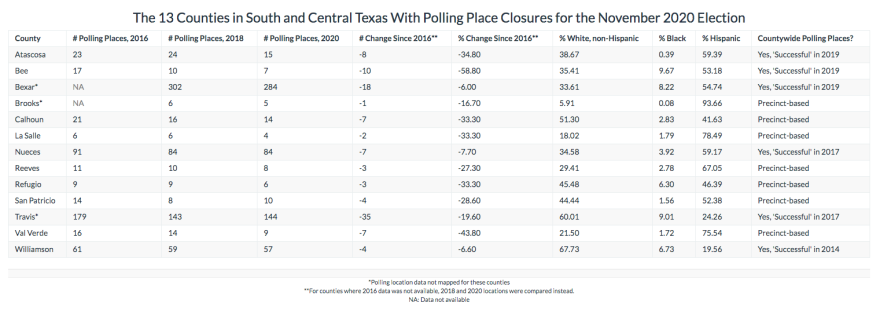Some people of color living in rural parts of Texas will drive farther to get to the polls today than white residents living in the same counties, according to research from Texas RioGrande Legal Aid.
The nonprofit serves 68 counties running from El Paso, down through the valley, to the Coastal Bend and South and Central Texas.

Lizzie Shackney, the group’s director of analytics and research, said it found 13 counties in those areas had closed Election Day polling locations between 2016 and 2020. The closures are predominately clustered along the western border of the state, she said, as well as in the Coastal Bend region.
“A lot of the rural counties in our service area are predominately Hispanic,” Shackney said, “so this is affecting populations of color.”
Travis County lost 35 polling locations, the highest number of the counties the group serves. But Shackney said Texas RioGrande Legal Aid was focused on how closures could affect voters in rural counties. "Reductions of polling locations will result in up to 58% fewer places to vote” in some of these smaller counties, according to the group's findings.

“I think a polling place closure anywhere is disruptive and problematic,” Shackney said. “But the inconvenience that you might face in a rural county is maybe greater.”
Researchers found, for example, that drive times grew for people in rural counties in the Coastal Bend area from one presidential election to the next.
“In Refugio County, the average drive distance in our sample increased by 24%, from 5.48 to 6.81 miles, for white people, and by 91%, from 3.55 to 6.77 miles, for people of color,” the report found. “This means that voters of color's drive distances have increased on average by almost 2.5 times as many miles as white voters’ as a result of polling place closures.”
In La Salle County, researchers found, the average driving distance increased by 4% for white voters and by 42% for voters of color.
Shackney said a lot of these poll closures follow years of Texas counties reducing polling locations. According to research from The Leadership Conference Education Fund, Texas lost at least 750 voting locations between 2012 and 2018. Many of these poll closures happened after the U.S. Supreme Court struck down a key provision of the Voting Rights Act in 2013.
Many counties – including Travis – have scaled back polling locations as they've moved to a countywide system that allows residents to vote at any polling location in their county. Per state law, counties that move to this system can reduce the total number of locations because voters have more options on where to vote.
Michele Carew, the Hood County elections administrator and current president of the Texas Association of Elections Administrators, said there are many reasons local election officials reduce polling locations. This election season, she said, they are dealing with issues completely out of their control.
“This year has been a lot more challenging, especially with COVID,” she said.
Carew said Hood County hasn't closed any polls, but she has heard issues from all over the state. For example, she said, larger counties have had trouble finding enough locations because of the pandemic.
“Most counties are doing everything that they can to make sure that [poll closures] are not an issue,” she said.
Whatever the reason, Shackney said she hopes local election officials find ways to alert residents when things like voting locations change.
“Any changes to polling places might affect your voting behavior,” she said. “If you are used to going somewhere … and then you go and things have changed that might discourage you from voting. You might lose confidence in a system that you thought you understand.”
Got a tip? Email Ashley Lopez at alopez@kut.org. Follow her on Twitter @AshLopezRadio.
If you found the reporting above valuable, please consider making a donation to support it. Your gift pays for everything you find on KUT.org. Thanks for donating today.







